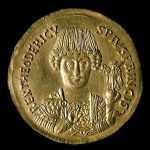Conference Report: International Medieval Congress 2024
- Erin Thomas Dailey
- 15 July 2024
- 0 Comment

By Justin Pigott
This month some of the DoSSE team made the short trip north to the International Medieval Congress in Leeds. As a historian of the late Roman east there was a plethora of papers for me to choose from, all of them of the highest quality. Of particular note was the Framing Disaster in Late Antiquity sessions, organised by the Centre for Late Antique, Islamic & Byzantine Studies at the University of Edinburgh. The highlight for me (although, such was the standard that it is very hard to single one out) was Kristina Sessa’s talk on how the sack of Rome in 410 was perceived in relationship to sin. Sessa’s comparison of Augustine and Orosius’ responses to the disaster to those of Jerome and Pelagius, for me, really illuminated the importance of appreciating the extent to which seemingly obscure theological debates impacted competing world-views in very real ways. Next up for me was the Late Antique and Byzantine Gender Crises session. While this session sadly ended up with only one paper, the presenter, PhD candidate Tiffany van Winkoop, did a sterling job, with a captivating exploration of the impact that inherently masculine court ceremonies had on influential imperial women who wielded power. The extra time available after the paper allowed for a robust discussion to ensue surrounding the benefits of applying queer theory to the topic. A debate in which I find it hard to think of a single reason why it should not be applied to its fullest extent.
Last on my schedule for Monday was Anxiety, Identity, and Resilience in the Byzantine ‘Long 6th Century’ organised by Ryan Strickler, who opened with a talk on hope in early Heraclian literature. I really like the idea of approaching such texts via a focus on hope and resilience during such periods of crisis. Focussing solely on the level of crises and pessimism presented in the sources (which is so often case), it would seem inconceivable that the empire could survive a week, let alone many more centuries. Therefore, considering the emotional resilience displayed in such sources, seems to me an important endeavour. However, as Bronwen Neil’s paper on Pandemic and Crisis in 6th-Century Constantinople demonstrated, we should not underestimate the near-apocalyptic challenges faced. So terrible was the “Justinianic” plague at Constantinople that, as Bronwen demonstrated, it shook to its foundations the idea that the Byzantines were a people chosen by God.
A particular highlight of Tuesday’s timetable was the well-attended session entitled ‘(Un)usual Suspects’ in Late Antique Prosopographies. This kicked off with our very own James Burns who presented his investigation into unnamed slaves in Gregory of Tours. By focussing on the sex, status, and terminology used, James explored the underlying patterns inherent in the various instances where Gregory did name slaves in contrast to those that remained anonymous. The session’s closing paper, Jessica van‘t Westeinde’s Towards a Jewish Prosopography in Late Antiquity, also left a lasting impression on me, highlighting the incredible importance of building a Jewish prosopography. A project that is unique in its ability to have such a broad impact on the work of so many scholars across many fields. After this I attended another fascinating session dedicated to the crisis-filled 6th-7th century: From Justinian to Heraclius: The Roman Empire in ‘Crisis’, 565-641.
Wednesday was another big day for the DoSSE team with Erin presenting the opening paper for the Slavery of Small Worlds: Servitude and Society in Late Antiquity session. This session – the first of two – was themed around the politics of domestic slavery. Erin explored Caesarius of Arles’ attitude towards domestic slaves by examining his sermons on the biblical story of Joseph. While Caesarius approached slaves as source of temptation and moral corruption in the home, he did not lay such blame on Joseph for inciting the lust of Potiphar’s wife. As Erin demonstrated, such seeming contradictions help untangle the intersection of slavery, gender, and hierarchy within the Christian households of late antique Gaul. Erin’s well-received paper paired nicely with my paper which looked at similar contradictions, this time that of John Chrysostom who preached against masters sleeping with their slaves, whilst lauding the biblical Abraham for doing just that. Finally, Sarah Christensen’s paper moved us away from ecclesiastical sermons and into the legal and narrative sources, looking for evidence of how enslaved women in the post-Roman world approached marriage and childbearing as means to secure emancipation. The potential for enslaved women to leverage marriage and childbearing in order to improve their situation is such an important topic, one that makes me wonder if the Christian exhortations to resist sexual interaction with slaves, in some cases, might have arguably increased inequity by shutting down this small avenue for social mobility.
The second session of Slavery of Small Worlds was themed around ‘Situating Slavery in Social Context’. First up was friend of DoSSE and one of the organisers of the session, Lisa Bailey. Lisa’s paper explored the metaphorical connection between slavery and marriage in early medieval texts within the context of contemporary debates about the right of enslaved people to marriages of their own. This was a highly engaging talk that yet again hammered home the importance of reading theological statements within the context of their social realities, as well as vice-versa. Next up was the session’s other organiser, Jamie Wood, who provided a fascinating look at church slaves in Visigothic Iberia, exploring evidence for the freeing of enslaved people belonging to churches. After Thom Gobbitt’s illuminating talk on Morth (the crime of secret killing) and the Unfree in Lombard Law, Hope Williard closed off the session with a poignant response that deftly tied all six papers together.
On the final day of the conference, I only made it to one session, but it proved to be a particularly good one. Getting it Wrong in Late Antiquity, I: Rhetoric Vs. Reality opened with a talk by Mathijs Clement on Gregory of Nazianzus’ self-construction as a tragic figure. Other highlights from the session were Daniil Kotov’s talk on Epistolary Misconduct and the
Origenist Controversy and Jeremy Swist’s look at Julian’s claims of being mislabelled a philosopher. Between such excellent papers there was of course many meetings, catch-ups, dinners and drinks. However, by far the most taxing part of the whole experience was working out how many new books would be too many to carry home…




